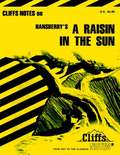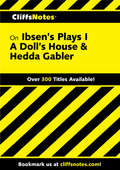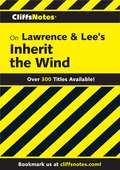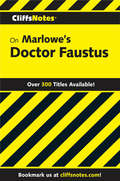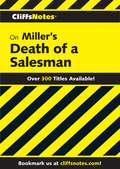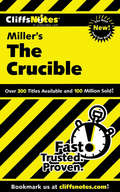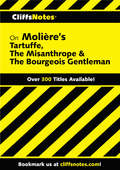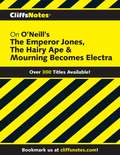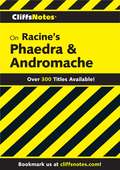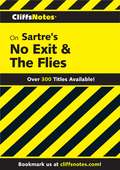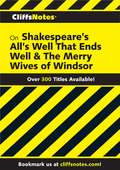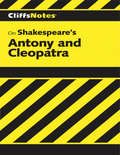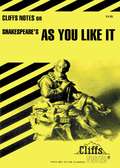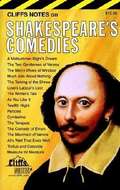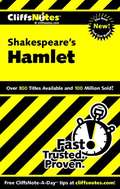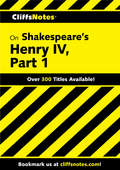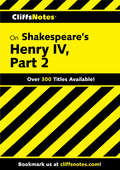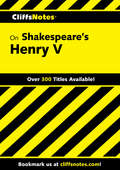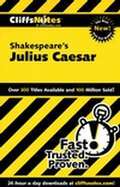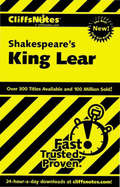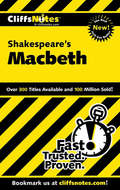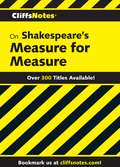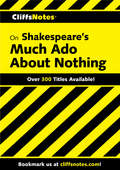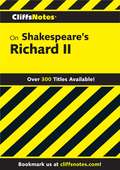- Table View
- List View
CliffsNotes on Hansberry's A Raisin in the Sun
by Rosetta JamesThe original CliffsNotes study guides offer expert commentary on major themes, plots, characters, literary devices, and historical background. The latest generation of titles in this series also feature glossaries and visual elements that complement the classic, familiar format.A Raisin in the Sun debuted in the spring of 1959 and has since been translated into more than 30 languages. It is the story of a poor black family struggling to become part of the middle class. Family hardships test the faith of all involved and the result is unexpected and filled with heartbreak.CliffsNotes on A Raisin in the Sun helps you explore this play by providing you with summaries and commentaries, chapter by chapter. You’ll also gain insight into the author Lorraine Vivian Hansberry. Other features that help you study includeA list of characters and their descriptionsA genealogy chart to illustrate the relationships between the charactersGlossaries to help you fully understand the novelCritical essays on thematic structure, language and style, and moreSuggested essay topics and related research projects for more studyClassic literature or modern-day treasure—you'll understand it all with expert information and insight from CliffsNotes study guides.
CliffsNotes on Ibsen's Plays I: A Doll's House & Hedda Gabler
by Marianne SturmanThe original CliffsNotes study guides offer a look into critical elements and ideas within classic works of literature.CliffsNotes on A Doll's House & Hedda Gabler takes you into Henrick Ibsen's dramatic plays, controversial theater productions that inflamed audience reactions in the nineteenth century.A Doll's House follows the story of a housewife who emerges from the confinement of her married life to confront the conditions of the outside world. Typical of Ibsen's dramas, Hedda Gabler portrays a depraved world in which women in particular submit to unsatisfying socially imposed roles. Summaries and expert commentaries cover each act within both plays; other features that help you figure out these important works includeLife and background of the playwrightSummary of Ibsen's most famous playsAnalysis of the plays' structure, themes, and charactersA complete list of Ibsen's dramaSample exam questions and essay topicsClassic literature or modern-day treasure — you'll understand it all with expert information and insight from CliffsNotes study guides.
CliffsNotes on Lawrence & Lee's Inherit the Wind
by Suzanne PavlosThe original CliffsNotes study guides offer expert commentary on major themes, plots, characters, literary devices, and historical background. The latest generation of titles in this series also feature glossaries and visual elements that complement the classic, familiar format.CliffsNotes on Inherit the Wind is an illuminating guide to the Jerome Lawrence and Robert E. Lee play about the evolution-versus-creationism debate. Chapter summaries and expert analysis provide insight into the central conflict between fundamentalist Matthew Harrison Brady and gifted orator Henry Drummond. The townspeople in this play also dramatize what freedom of thought -- as well as "the right to be wrong" -- truly mean. Other features that help you study includeCharacter analyses of major playersA character map that graphically illustrates the relationships among the charactersCritical essays on the play's themes, conflicts, and moreA review section that tests your knowledgeBackground information on the playwrights and their partnershipClassic literature or modern modern-day treasure — you'll understand it all with expert information and insight from CliffsNotes study guides.
CliffsNotes on Marlowe's Doctor Faustus
by Eva FitzwaterThis CliffsNotes guide includes everything you've come to expect from the trusted experts at CliffsNotes, including analysis of the most widely read literary works.
CliffsNotes on Miller's Death of a Salesman
by Jennifer L. ScheidtThe original CliffsNotes study guides offer a look into critical elements and ideas within classic works of literature. The latest generation of titles in this series also feature glossaries and visual elements that complement the classic, familiar format.CliffsNotes on Death of a Salesman shares an intimate glimpse into the dreams and disappointments of an American family.Following the story of Willy Loman, an aging salesman who can't accept change within himself and society, this study guide provides a character list, character map, and character analyses to explore the personalities within Arthur Miller's masterful play. Other features that help you figure out this important work includePersonal and career background of the authorIntroduction to and brief synopsis of the playSummaries and expert commentaries for each act and sceneEssays that explore the play's major themes and the author's manipulation of time and spaceA review section that tests your knowledge and suggests essay topics and practice projectsA Resource Center full of books, publications, films, and Internet resourcesClassic literature or modern-day treasure -- you'll understand it all with expert information and insight from CliffsNotes study guides.
CliffsNotes on Miller's The Crucible
by Jennifer L. Scheidt Denis M. CalandraThe original CliffsNotes study guides offer a look into critical elements and ideas within classic works of literature. The latest generation of titles in this series also feature glossaries and visual elements that complement the classic, familiar format.CliffsNotes on The Crucible takes you into Arthur Miller's play about good and evil, self-identity and morality.Following the atmosphere and action of the Salem witch trials of the 1600s, this study guide looks into Puritan culture with critical commentaries about each act and scene. Other features that help you figure out this important work includeLife and background of the authorIntroduction to the playCharacter web and in-depth analyses of the major rolesSummaries and glossaries related to each actEssays that explore the author's narrative technique and the play's historical settingA review section that tests your knowledge and suggests essay topics and practice projectsA Resource Center for checking out details on books, publications, and Internet resourcesClassic literature or modern-day treasure -- you'll understand it all with expert information and insight from CliffsNotes study guides.
CliffsNotes on Moliere's Tartuffe, The Misanthrope & The Bourgeois Gentleman
by James L. Roberts Denis M. CalandraThis CliffsNotes guide includes everything you've come to expect from the trusted experts at CliffsNotes, including analysis of the most widely read literary works.
CliffsNotes on O'Neill's The Emperor Jones, The Hairy Ape & Mourning Becomes Electra
by James L. Roberts Peter ClarkThis CliffsNotes guide includes everything you’ve come to expect from the trusted experts at CliffsNotes, including analysis of the most widely read literary works.
CliffsNotes on Racine's Phaedra & Andromache
by George KlinThis CliffsNotes guide includes everything you’ve come to expect from the trusted experts at CliffsNotes, including analysis of the most widely read literary works.
CliffsNotes on Sartre's No Exit & The Flies
by W John CampbellThis CliffsNotes guide includes everything you’ve come to expect from the trusted experts at CliffsNotes, including analysis of the most widely read literary works.
CliffsNotes on Shakespeare's All's Well That Ends Well & The Merry Wives of Windsor
by Denis M. CalandraThis CliffsNotes guide includes everything you've come to expect from the trusted experts at CliffsNotes, including analysis of the most widely read literary works.
CliffsNotes on Shakespeare's Antony and Cleopatra
by James F. Bellman Kathryn BellmanThe dilemma between heart, head, romance, and ambition has not been told with such elegance and depth as in Shakespeare's play. With revelries of poetic love and the drudgery of tragedy, this drama of the Egyptian queen and the Roman military leader is actually a microcosm of life.
CliffsNotes on Shakespeare's As You Like It
by Tom SmithAs You Like It tracks the travails of young lovers and despotic rulers as they chase one another from the palace of Duke Frederick to the Forest of Arden. Shakespeare's classic work weaves together greedy inheritors, despotic rulers, a cross-dressing princess, and some magic before drawing to a dramatic close.
CliffsNotes on Shakespeare's Comedies
by James L. Roberts Gary CareyNow available in one easy-to-access volume-- Cliffs Notes for all of Shakespeare's comedies. Includes A Midsummer-Night's Dream, The Two Gentlemen of Verona, The Merry Wives of Windsor, Much Ado About Nothing, The Taming of the Shrew, Love's Labour's Lost, The Winter's Tale, As You Like It, Twelfth Night, Pericles, Cymbeline, The Tempest, The Comedy of Errors, The Merchant of Venice, All's Well That Ends Well, Troilus and Cressida, and Measure for Measure.
CliffsNotes on Shakespeare's Hamlet
by Carla Lynn StocktonThe original CliffsNotes study guides offer expert commentary on major themes, plots, characters, literary devices, and historical background. The latest generation of titles in this series also feature glossaries and visual elements that complement the classic, familiar format.Something may be rotten in the state of Denmark, but your grades will be sweet when you rely on CliffsNotes on Hamlet as you digest Shakespeare's tragic masterpiece. In this play, Hamlet explores the meaning of life, death, eternity, relationships, hypocrisy, truth, the existence of God, and almost anything else that concerns mankind.Character studies shed new light on Prince Hamlet, his father King Hamlet, the malevolent Claudius, the troubled Ophelia -- and the rest of the cast. You'll also explore the life and times of William Shakespeare, and unlock the play's themes and literary devices. Count on CliffsNotes on Hamlet for detailed summaries and commentaries on every scene to help you appreciate the complexity of the play.Other features that help you study include Character analyses of major playersA character map that graphically illustrates the relationships among the charactersCritical essaysA review section that tests your knowledgeClassic literature or modern modern-day treasure -- you'll understand it all with expert information and insight from CliffsNotes study guides.
CliffsNotes on Shakespeare's Hamlet
by Carla Lynn StocktonThe original CliffsNotes study guides offer expert commentary on major themes, plots, characters, literary devices, and historical background. The latest generation of titles in this series also feature glossaries and visual elements that complement the classic, familiar format.Something may be rotten in the state of Denmark, but your grades will be sweet when you rely on CliffsNotes on Hamlet as you digest Shakespeare's tragic masterpiece. In this play, Hamlet explores the meaning of life, death, eternity, relationships, hypocrisy, truth, the existence of God, and almost anything else that concerns mankind.Character studies shed new light on Prince Hamlet, his father King Hamlet, the malevolent Claudius, the troubled Ophelia — and the rest of the cast. You'll also explore the life and times of William Shakespeare, and unlock the play's themes and literary devices. Count on CliffsNotes on Hamlet for detailed summaries and commentaries on every scene to help you appreciate the complexity of the play.Other features that help you study include Character analyses of major playersA character map that graphically illustrates the relationships among the charactersCritical essaysA review section that tests your knowledgeClassic literature or modern modern-day treasure — you'll understand it all with expert information and insight from CliffsNotes study guides.
CliffsNotes on Shakespeare's Henry IV, Part 1
by James K LowersThis popular play entertains and inspires in alternating comic scenes and serious ones and is the birthplace of one of the theater's greatest characters, Sir John Falstaff. Young Prince Hal rebels against his father the king until he must go to the king's aid to stamp out the rebellion of nobles.
CliffsNotes on Shakespeare's Henry IV, Part 2
by James K LowersThis popular play entertains and inspires in alternating comic scenes and serious ones and is the birthplace of one of the theater's greatest characters, Sir John Falstaff. Young Prince Hal rebels against his father the king until he must go to the king's aid to stamp out the rebellion of nobles.
CliffsNotes on Shakespeare's Henry V
by Jeffrey FisherThe original CliffsNotes study guides offer expert commentary on major themes, plots, characters, literary devices, and historical background. The latest generation of titles in this series also feature glossaries and visual elements that complement the classic, familiar format.In CliffsNotes on Henry V (the final play in Shakespeare's political tetralogy), you once again meet young Prince Hal who is now the ideal Christian monarch, King Henry V. To retain power and increase revenue, he finds he must lead his soldiers in battle against France to reclaim land and titles.A character study on King Henry V and a close look at sixteenth century politics shed light on the Bard's intentions for the play. You'll also explore synopses of the three related history plays that lead up to Henry V. Count on CliffsNotes on Henry V for detailed summaries and commentaries on every scene to help you appreciate the complexity of the play.Other features that help you study include A list of characters and their rolesAn interactive quizEssay topics and review questionsClassic literature or modern modern-day treasure — you'll understand it all with expert information and insight from CliffsNotes study guides.
CliffsNotes on Shakespeare's Julius Caesar
by Martha Perry James E. VickersThe original CliffsNotes study guides offer summaries and expert commentary on major themes, plots, characters, literary devices, and historical background. The latest generation of titles in this series also feature glossaries and visual elements that complement the classic, familiar format.In CliffsNotes on Julius Caesar, you follow the dramatic political battles of Rome during the height of the Pax Romanum. Shakespeare pits Caesar against an untold number of conspirators and lets the daggers fly. In the end, who will carry on the rule of the Caesars?This user-friendly guide makes studying a snap -- with visual icons flagging key themes, literary devices, and more. You'll come to understand the overall structure of the play, actions and motivations of the characters, and the social and cultural perspectives of the author. Features that help you study includeShakespeare's background and career highlightsScene-by-scene summariesCharacter analyses of major playersA character map that graphically illustrates the relationships among the charactersCritical essaysA review section that tests your knowledgeGlossaries of key words and termsClassic literature or modern modern-day treasure -- you'll understand it all with expert information and insight from CliffsNotes study guides.
CliffsNotes on Shakespeare's King Lear
by Sheri MetzgerThe original CliffsNotes study guides offer expert commentary on major themes, plots, characters, literary devices, and historical background. The latest generation of titles in this series also feature glossaries and visual elements that complement the classic, familiar format. In CliffsNotes on Shakespeare's King Lear, you explore one of Shakespeare's greatest tragedies - the gripping story of greed, treachery, and murder among sisters; and the foolhardiness and revelation of a father. This study guide carefully walks you through every twist and turn of Shakespeare's classic by providing summaries and critical analyses of each act and scene of the play. You'll also explore the life and background of the "Bard" himself -- William Shakespeare. Other features that help you study include Character analyses of major players A character map that graphically illustrates the relationships among the characters Critical essays A review section that tests your knowledge Glossaries of difficult words and phrases Classic literature or modern modern-day treasure - you'll understand it all with expert information and insight from CliffsNotes study guides.
CliffsNotes on Shakespeare's Macbeth
by Alex WentThe original CliffsNotes study guides offer expert commentary on major themes, plots, characters, literary devices, and historical background. The latest generation of titles in this series also feature glossaries and visual elements that complement the classic, familiar format.Packed with action and vivid portrayal of human relationships, Shakespeare's Macbeth traces the bloody climb to power and tragic ruin of a fate-plagued king. Count on CliffNotes on Macbeth to carry you through the rise and fall of a cast of characters that includes a cruel and ambitious warrior, his wicked wife, and a trio of witches who have wormed their way into audiences' hearts since William Shakespeare first presented their prophecies about 300 years ago.Show your classmates - and your grade-granting teacher - that you're in the know with English literature. You can't miss with scene summaries, plot explorations, language simplification, and insights into the author's life and times. Other features that help you study includeA brief synopsis of the playA character map to help you see relationships among the charactersCritical essays on major themes and stage productionsAn interactive quiz to test your knowledgeEssay topics and practice projectsClassic literature or modern modern-day treasure - you'll understand it all with expert information and insight from CliffsNotes study guides.
CliffsNotes on Shakespeare's Measure For Measure
by L. L. HillegassThis CliffsNotes guide includes everything you’ve come to expect from the trusted experts at CliffsNotes, including analysis of the most widely read literary works.
CliffsNotes on Shakespeare's Much Ado About Nothing
by Richard O PetersonOne of Shakespeare's romantic comedies, this play is set in the seaport town of Messina, in Sicily. The drama concerns "the battle of the sexes" and focuses on the barbed wits and intrigues that two sets of lovers and their friends and family create. Brimming with wit and antagonism, the play has amused and provoked audiences for centuries.
CliffsNotes on Shakespeare's Richard II
by Denis M. CalandraThis CliffsNotes guide includes everything you’ve come to expect from the trusted experts at CliffsNotes, including analysis of the most widely read literary works.
